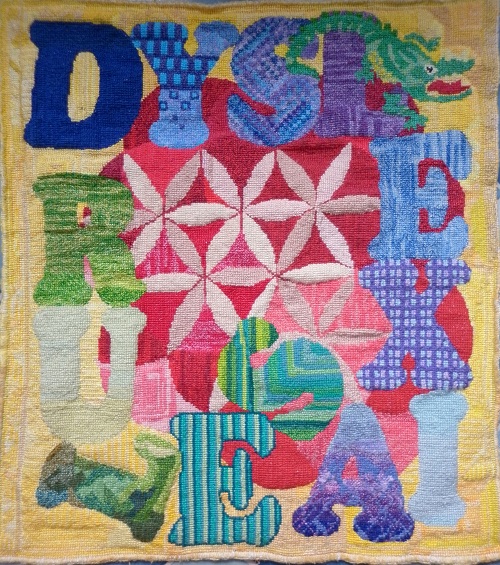
Invisible disabilities: understanding dyslexia
Not all disabilities are obvious, or even visible. New Disability Horizons writer, Aurora Betony, shares her experiences of adult dyslexia, how people perceive it, and offers some guidance and support on adult dyslexia.
I was identified with dyslexia in mid-adulthood.
When I was identified I felt relieved. It was frustrating that I hadn’t known sooner how dyslexia affects me. But being assessed let me understand that, and so gave me the possibility of fulfilling my potential. It was liberating and exhilarating.
Now, I write accessible self-help resources for dyslexic adults. I also write guidance on adult dyslexia for people, such as web developers and writers, so they know how to make things more accessible for people with dyslexia.
How do people perceive dyslexia?
Few people realise that dyslexic people are unique, like snowflakes. Dyslexic people share a group of characteristics between them, which you can label as ‘dyslexia’.
But dyslexic people are all unique in how that label applies to them. Many people don’t realise this – they find out a bit about dyslexia and think that’s all there is to know.
For example, they might be familiar with how dyslexia affects someone they know, and then wrongly assume that every dyslexic person experiences dyslexia in the same ways.
People’s perceptions of dyslexia vary
Because they can’t see it, some people struggle to accept that dyslexia exists. Neither do they recognise the signs of dyslexia because they don’t know what the signs are.
People see dyslexia as:
a) A disability, in accordance with the Equality Act 2010.
b) A ‘learning difference’, because they find the term ‘disability’ limiting or wrong.
c) A gift. For example, author Rowan Coleman and managing director Debbie Edgar both see their dyslexia as something that has helped them to succeed.
d) A set of difficulties that make them suffer.
e) A mixture of strengths and difficulties.

My own experiences of dyslexia
My strengths help me to overcome my difficulties
Dyslexia presents me with many different challenges. But it also gives me strengths I can use to meet those challenges.
I’m good at divergent thinking, which is where you come up with multiple solutions in response to a single problem. I’m also resourceful, so I’ve been able to find things that help me.
For example, I sometimes struggle to take in the meaning of a passage of text I read. But I have discovered that if I listen to text in audio format, rather than read it in print, I take it in better.
Self-managing my dyslexia is demanding but has its benefits
As the above example illustrates, in order to succeed at something, I have to invent my own ways of doing it. That means being innovative and reflective.
Then, once I’ve devised an approach that works for me, I need to use it. This often takes courage because dyslexia-friendly approaches can be unconventional. Doing things differently from others provokes a reaction in them. That reaction is another thing I have to deal with.
Succeeding also involves me finding or creating opportunities to use my strengths. That takes bravery too, and perseverance.
So self-managing my dyslexia is demanding of my time, energy and patience. Sometimes these extra demands, combined with the task at hand, feel onerous. But there are benefits. Having to create alternative approaches has developed my ability to solve problems.
Dyslexia guidance and support I’ve used and created
I receive support from people I come across in everyday contexts. They don’t have any particular insight into dyslexia. They simply accept me as I am and respond to me with empathy and common sense. For example, they notice things I do well and give me opportunities to do them.
I also receive guidance and support from various organisations and networks. This includes peer support and input from specialists.
Here are some resources on adult dyslexia that I would recommend. They include some that I’ve created myself, to fill gaps in the existing provision.
- Free downloadable resources by Sylvia Moody
- Self-help resources for dyslexic people
- Making Dyslexia Work for You – a book full of strategies and activities.
- Read Me Differently – a film that explores the impact of dyslexia on adult family members.
- The Dyslexic Advantage – a book about the unique strengths of dyslexia.
- The Dyslexic Adult in a Non-Dyslexic World – a book about dyslexic adults who have been identified in adulthood.
- Tips for engaging with books
- Dyslexia alert cards
- Making written web content accessible using text readers
- Writing for a dyslexic audience
By Aurora Betony
Image credit: Doreen Kelly
Get in touch by messaging us on Facebook, tweeting us @DHorizons, emailing us at editor@disabilityhorizons.com or leaving your comments below.
https://disabilityhorizonscom.onyx-sites.io/2017/04/invisible-disability-coping-when-everyone-thinks-youre-healthy/
https://disabilityhorizonscom.onyx-sites.io/2017/09/accepting-your-disability-and-living-your-life/
One Comment